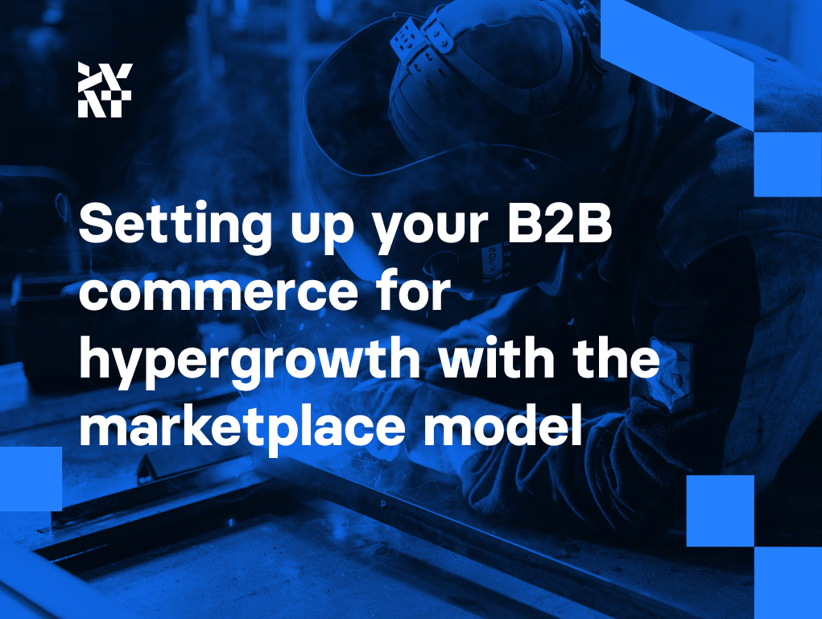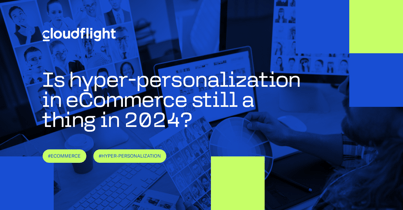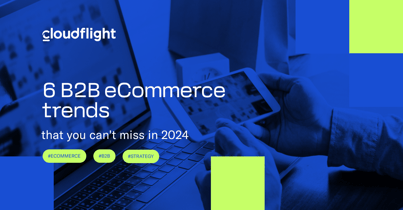Increase direct-to-consumer sales. Cut the distribution path. Grow an online presence. Look into the profit pools of distributors. These are only a very few of the challenges that B2B companies face right now, and they’ll only grow in importance in the future. Fortunately, all of that is manageable with the right B2B commerce platform.
Buyers expect an omnichannel experience, order tracking, and a preview of current inventory with an eCommerce website. These are features you need to offer since competitors offer these types of amenities for their customers. It’s also worth mentioning that younger generations are naturally proficient online, emphasizing the need for a quality digital B2B sales experience.
Well-known online players, like Amazon, also entered the B2B sector, and this is another factor that accelerates competition. Switching from offline to online for distributors is not the only thing happening in this space. There’s also movement from digital natives that maybe lack the product knowledge or expertise but, for sure, have much more experience with the online sales process.

The rising competition for B2B eCommerce platforms
Amazon joined the competition in the billion-dollar market for corporate business customers. Their B2B marketplace, Amazon Business, is used by over 5 million businesses worldwide and reached $25 billion in worldwide annualized sales. Other B2B online marketplaces, like Wucato or Mercateo, help companies in almost every industry manage sales via digital channels.
On the other side, specific industry marketplaces can adapt much better to market conditions and offer complementary services. They also have a much more profound knowledge of the assortment than “multi-sector” marketplaces. CheMondis and Equippo are good examples of building digital marketplaces for more industry-specific digital marketplaces, like chemicals and construction equipment.
By implementing dedicated online platforms, the third force in this battle is the suppliers themselves. One good example is Würth with its multi-channel strategy, including digital. The company used a product information management solution to digitize processes on a massive scale. Here at Divante, we build a centralized solution covering nine companies from six Eastern European countries. Read more about it in our case study.
There’s no doubt that Amazon will try to grow to be as dominant as they are in the B2C market. Still, smaller specialty marketplaces are hard to beat in expertise and flexibility, not to mention the heavy industry and their specific products. However, office supplies, IT accessories, and the possibility to reach multiple third-party retailers at the same time make it very tempting for smaller companies. It’s just one click away from a private Amazon account, and we all know how convenient their shopping experience is.

Connecting distributors, wholesalers, and manufacturers
Whether you are a distributor, wholesaler, manufacturer, B2C retailer, or maybe a few of them at the same time, there’s always the question of how the current system should connect within the digital platform. While choosing one, you should look for case studies of similar business models, clients, and scale. Every business is different, so your future platform should be fully configurable, including pre-built connectors to quickly launch the marketplace and flexible APIs to synchronize with your current ecosystem in order to expand it.
The answer to this is the Mirakl platform, which transforms many B2B commerce sites into a platform for hypergrowth with the marketplace model. Distributors and wholesalers can quickly and easily add new products, including third-party sellers and providers. With multiple suppliers available, you can let them compete to offer the best terms for the buyers. As a manufacturer, you can build an eCommerce site and grow sales without inventory management because you can allow your distribution partners to sell through your site. Still, you can control the buyer’s user experience, gain new insights, and collect data for marketing activities.
What is Mirakl?
Mirakl offers one of the most advanced SaaS enterprise marketplace platforms. It’s suitable for B2B and B2C. Organizations across various industries can launch their own marketplace and expand their business at scale with the Mirakl Connect ecosystem. Some of the world’s most known companies, like Best Buy Canada, Carrefour, Leroy Merlin and ABB, trust Mirakl to run their marketplaces in the constantly changing eCommerce landscape.

Integrating the offline sales process in the marketplace ecosystem or marketplace model for different use cases
With the Mirakl platform’s flexibility, you can launch marketplaces in different models and customize them to meet your business needs. I want to tell you more about two use cases that reflect different approaches and strategies.
Boosting omnichannel strategy for Conrad
Launching a marketplace with third-party products allows for meeting customer expectations in terms of the vast product range. Before the implementation, they were selling around 700,000 electronic products. Now, it’s more than 5 million offers with a 500% increase in orders when compared to three years before launching the marketplace.
Traditional B2B selling usually relies on human-to-human interaction. The digital marketplace should help your sales team. For example, Mirakl enables internal employees to create quotes based on marketplaces products for B2B customers. Other tools support sales needs, like negotiation tools, quantity discounts, or order management for multiple vendors.
Integrating dealerships in the marketplace ecosystem for Toyota Material Handling USA
The buying experience in the B2B automotive sector usually involves a wordy sales process that takes place over the phone. To improve that, Toyota Material Handling USA (TMHU) decided to make eCommerce the center for their digitalization strategy by launching a site to sell its product online.
Keeping in mind dealer relationships and avoiding affecting their sales by directly selling to the expected buyers, they decided to launch a marketplace and bring dealers into the seller’s position. TMHU offered them a digital sales tool to reach more customers and, overall, gave Toyota more presence with their clients without channel conflicts.
The result of implementing the marketplace? More than 600,000 available offers, sales growth of 220% YoY, and 70% of orders from new customers.
Summary
There are many strategies for how to transform B2B commerce into a platform with the marketplace model. Regardless of the chosen path, there will always be the question of which platform will be the best for digital transformation. It should cover the current needs but also the needs for future growth and expansion. Mirakl, with its wide range of B2B and B2C enterprise solutions, seems like the right choice for companies that need an all-in-one marketplace.
Want to know more? Register for the Mirakl Platform Pioneer Summit now and discover the enterprise marketplace strategies of B2B platform pioneers like Conrad Electronics, Kramp, Saloncentric, and many more.
Published April 22, 2021











